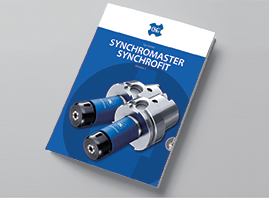Utilizziamo i cookie per rendere migliore la tua esperienza di navigazione. Per rispettare la nuova direttiva sulla privacy, è necessario chiedere il tuo consenso per impostare i cookie. Per saperne di più.
SynchroMaster • SynchroFit Vol.2
Next generation synchronized tap holder designed to turbocharge tapping performance
Takayuki Nakajima | OSG Corporation Applications Engineer
Machining troubles associated with tap processing are far more frequent in comparison to other rotating tools, such as drills and end mills. Manufacturers often struggle with threading applications because there are few effective solutions. For example, what kind of measurements would you take to achieve the following?
- Prevent sudden breakage of taps
- Stabilize tap life
- Improve thread quality
- Stabilize short chamfer taps’ performance
All of the above are difficult to achieve. When a tapping problem arises, most operators would troubleshoot by lowering the cutting speed, which would in turn reduce productivity.
To help manufacturers who use machining centers with synchronous spindles overcome these common tapping obstacles, OSG Corporation has recently introduced a new generation synchronized tap holder – the SynchroMaster – engineered to turbocharge performance by dampening excessive forces in rigid tapping environment.
Why Tap Processing is Difficult
One of the causes is that the feed per revolution is fixed. The cutting of internal threads is performed by the chamfer section of a cut tap. In principle, the full thread portion of a cut tap does not perform any cutting, but merely follows the path cut by the chamfer. As the tap rotates, each cutting edge of the chamfer gradually increases the depth of cut along the lead, which forms the thread ridges to guide the position of the tap thereafter. Figure 1 illustrates the tapping process in the case of a 4-flute cut tap.
Figure 1. Cutting process of tap (4-flute)

Rigid tapping, also known as synchronous feed tapping, is one of the most common tapping methods used on modern machining centers. If the machine’s spindle rotation and feed are synchronized to match a specific thread pitch as the tap is driven in and out of a hole, the shape of the pitch would be correctly formed. When there is a feeding error (leading or delaying), a size reduction (pitch dislocation or enlargement) would occur, which affects the precision of threads. Figure 2 illustrates a scenario where the tap feeding error (leading) occurred due to excessive cutting force, which causes size reduction of the internal threads.
Figure 2. Size reduction due to cutting by leading

Theoretically, a solid type tap holder without any tension-compression is appropriate for machining centers with synchronous spindles. However, there will always be small discrepancies between the synchronization and the actual movement (feed) of the specific tap being used. As the machine ages, the discrepancy between the spindle speed and feed and the tap’s movement can become more significant.With a solid holder where no movable value is permitted, any deviation occurred would increase the thrust load on the tap, which would greatly reduce tool life and thread quality due to the extra axial forces being exacted.
Fortunately, with the right combination of machining center and tap holder as illustrated in figure 3, feeding error can be prevented.
Figure 3. Combination of machining center and tap holder

Features & Benefits of SynchroMaster
The SynchroMaster is a tap holder constructed to allow a slight amount of axial movement to compensate for axial deviations that are unavoidable in rigid tapping. Its micro tension-compression float eliminates the extra axial forces on the tap, leading to longer tool life, consistent tapping depth and improved thread quality. As illustrated in figure 4, the uniquely integrated float unit absorbs the loads in the thrust direction, significantly reduces thrust forces occur during reverse rotation.

Figure 4. Comparison of thrust force during machining

Cutting Data
Figure 5 illustrates a tool life comparison of a short chamfer tap when used in combination with the SynchroMaster tap holder and a solid type holder. The cutting tool used for the test was a M4 x 0.7 1P short chamfer spiral tap. The shorter the chamfer, the cut made per cutting edge increases. For this reason, applications with short chamfer taps can easily become unstable. Tapping in S45C, the M4 x 0.7 1P short chamfer spiral tap with solid type holder averaged approximately 200 holes. When use in combination with the SynchroMaster tap holder, on the other hand, thrust load was significantly reduced and the short chamfer tap was able to achieve nearly five times the durability versus the solid type holder.

Figure 5. Short chamfer spiral tap tool life comparison

Additionally, as illustrated in figure 6, the SynchroMaster tap holder is effective not only for cut taps, but also for form taps. Since cutting does not take place with form taps and the internal thread is processed by using the plastic deformation of the material, the processing load for form taps is even higher than cut taps. As highlighted in figure 6, the SynchroMaster tap holder was able to double the tool life versus solid type holder even for form taps.
Figure 6. Form tap tool life comparison

For manufacturers who are especially struggling with unstable tool life, poor thread quality, low productivity and large variations in depth lengthon rigid tapped holes, look to the SynchroMaster tap holder to turbocharge your tapping performance.

- Alesatori
- Brochures
- Catalogo generale
- Certificates
- Downloads
- Eventi
- Frese
- Frese a filettare
- I nostri partners
- Maschi
- Membri del gruppo
- Notizie
- Promozioni
- Punte
- SHAPE IT
- Software di programmazione NC
- Soluzioni per l’industria
- Tamponi di controllo
- Tutti i blog
- Utensili a fissaggio meccanico
- Utility
- Videos
